Analyzing Ted Bundy's Criminal Behavior Through Psychology
VerifiedAdded on 2023/06/07
|9
|3024
|285
Case Study
AI Summary
This case study delves into the psychological underpinnings of Ted Bundy's criminal behavior, utilizing sociological and psychological theories to understand the factors contributing to his actions. It explores behavioral theories, including Bandura’s behavioral theory and Sigmund Freud’s theories, to analyze Bundy's development of criminal tendencies, tracing back to his early childhood experiences such as the absence of a father figure and a lack of parental affection. The study discusses attachment theory, highlighting how the absence of secure attachments during his formative years contributed to his delinquent behavior and inability to form relationships. Furthermore, it examines Freud’s concepts of ‘id,’ ‘ego,’ and ‘super-ego’ to explain how Bundy’s failure to develop a strong super-ego led to his engagement in criminal activities, driven by unchecked desires of the ‘id.’ The case study also considers the Oedipal theory, suggesting that resentment towards his stepfather and a general dislike for women influenced his behavior. The study provides an in-depth look at how early life experiences shaped Bundy’s psychological state, ultimately leading to his horrific crimes.

Psychology of crime
Paraphrase This Document
Need a fresh take? Get an instant paraphrase of this document with our AI Paraphraser
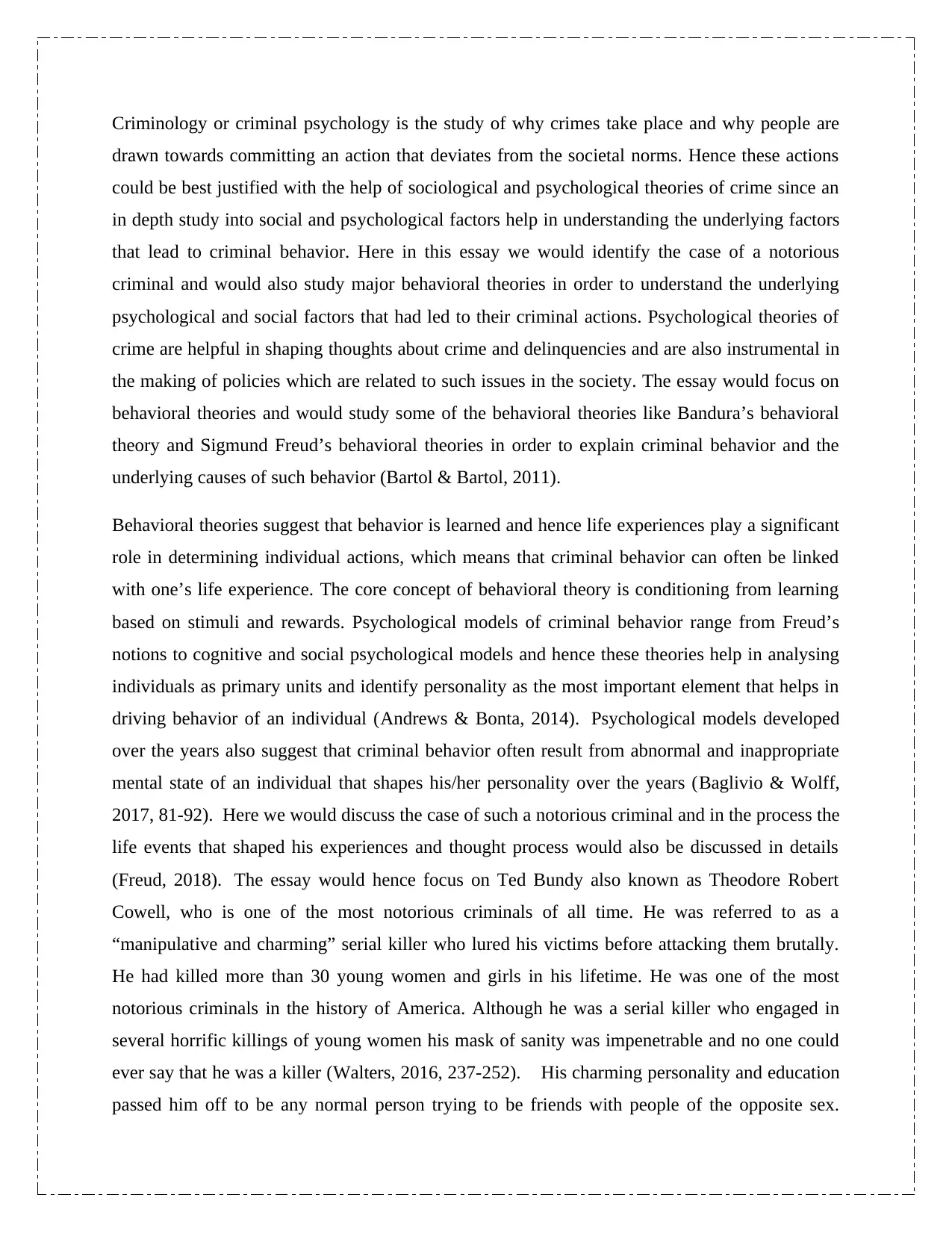
Criminology or criminal psychology is the study of why crimes take place and why people are
drawn towards committing an action that deviates from the societal norms. Hence these actions
could be best justified with the help of sociological and psychological theories of crime since an
in depth study into social and psychological factors help in understanding the underlying factors
that lead to criminal behavior. Here in this essay we would identify the case of a notorious
criminal and would also study major behavioral theories in order to understand the underlying
psychological and social factors that had led to their criminal actions. Psychological theories of
crime are helpful in shaping thoughts about crime and delinquencies and are also instrumental in
the making of policies which are related to such issues in the society. The essay would focus on
behavioral theories and would study some of the behavioral theories like Bandura’s behavioral
theory and Sigmund Freud’s behavioral theories in order to explain criminal behavior and the
underlying causes of such behavior (Bartol & Bartol, 2011).
Behavioral theories suggest that behavior is learned and hence life experiences play a significant
role in determining individual actions, which means that criminal behavior can often be linked
with one’s life experience. The core concept of behavioral theory is conditioning from learning
based on stimuli and rewards. Psychological models of criminal behavior range from Freud’s
notions to cognitive and social psychological models and hence these theories help in analysing
individuals as primary units and identify personality as the most important element that helps in
driving behavior of an individual (Andrews & Bonta, 2014). Psychological models developed
over the years also suggest that criminal behavior often result from abnormal and inappropriate
mental state of an individual that shapes his/her personality over the years (Baglivio & Wolff,
2017, 81-92). Here we would discuss the case of such a notorious criminal and in the process the
life events that shaped his experiences and thought process would also be discussed in details
(Freud, 2018). The essay would hence focus on Ted Bundy also known as Theodore Robert
Cowell, who is one of the most notorious criminals of all time. He was referred to as a
“manipulative and charming” serial killer who lured his victims before attacking them brutally.
He had killed more than 30 young women and girls in his lifetime. He was one of the most
notorious criminals in the history of America. Although he was a serial killer who engaged in
several horrific killings of young women his mask of sanity was impenetrable and no one could
ever say that he was a killer (Walters, 2016, 237-252). His charming personality and education
passed him off to be any normal person trying to be friends with people of the opposite sex.
drawn towards committing an action that deviates from the societal norms. Hence these actions
could be best justified with the help of sociological and psychological theories of crime since an
in depth study into social and psychological factors help in understanding the underlying factors
that lead to criminal behavior. Here in this essay we would identify the case of a notorious
criminal and would also study major behavioral theories in order to understand the underlying
psychological and social factors that had led to their criminal actions. Psychological theories of
crime are helpful in shaping thoughts about crime and delinquencies and are also instrumental in
the making of policies which are related to such issues in the society. The essay would focus on
behavioral theories and would study some of the behavioral theories like Bandura’s behavioral
theory and Sigmund Freud’s behavioral theories in order to explain criminal behavior and the
underlying causes of such behavior (Bartol & Bartol, 2011).
Behavioral theories suggest that behavior is learned and hence life experiences play a significant
role in determining individual actions, which means that criminal behavior can often be linked
with one’s life experience. The core concept of behavioral theory is conditioning from learning
based on stimuli and rewards. Psychological models of criminal behavior range from Freud’s
notions to cognitive and social psychological models and hence these theories help in analysing
individuals as primary units and identify personality as the most important element that helps in
driving behavior of an individual (Andrews & Bonta, 2014). Psychological models developed
over the years also suggest that criminal behavior often result from abnormal and inappropriate
mental state of an individual that shapes his/her personality over the years (Baglivio & Wolff,
2017, 81-92). Here we would discuss the case of such a notorious criminal and in the process the
life events that shaped his experiences and thought process would also be discussed in details
(Freud, 2018). The essay would hence focus on Ted Bundy also known as Theodore Robert
Cowell, who is one of the most notorious criminals of all time. He was referred to as a
“manipulative and charming” serial killer who lured his victims before attacking them brutally.
He had killed more than 30 young women and girls in his lifetime. He was one of the most
notorious criminals in the history of America. Although he was a serial killer who engaged in
several horrific killings of young women his mask of sanity was impenetrable and no one could
ever say that he was a killer (Walters, 2016, 237-252). His charming personality and education
passed him off to be any normal person trying to be friends with people of the opposite sex.
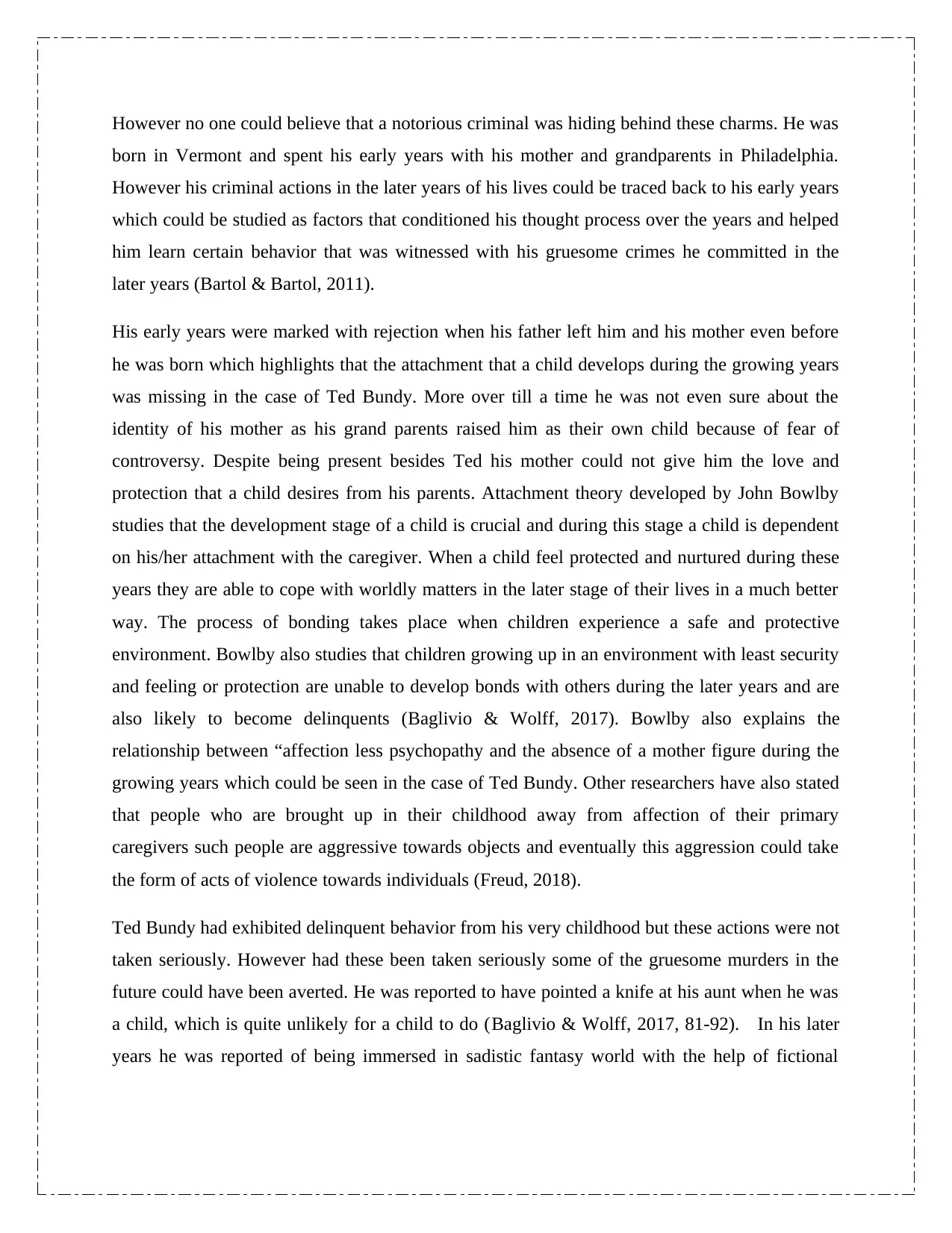
However no one could believe that a notorious criminal was hiding behind these charms. He was
born in Vermont and spent his early years with his mother and grandparents in Philadelphia.
However his criminal actions in the later years of his lives could be traced back to his early years
which could be studied as factors that conditioned his thought process over the years and helped
him learn certain behavior that was witnessed with his gruesome crimes he committed in the
later years (Bartol & Bartol, 2011).
His early years were marked with rejection when his father left him and his mother even before
he was born which highlights that the attachment that a child develops during the growing years
was missing in the case of Ted Bundy. More over till a time he was not even sure about the
identity of his mother as his grand parents raised him as their own child because of fear of
controversy. Despite being present besides Ted his mother could not give him the love and
protection that a child desires from his parents. Attachment theory developed by John Bowlby
studies that the development stage of a child is crucial and during this stage a child is dependent
on his/her attachment with the caregiver. When a child feel protected and nurtured during these
years they are able to cope with worldly matters in the later stage of their lives in a much better
way. The process of bonding takes place when children experience a safe and protective
environment. Bowlby also studies that children growing up in an environment with least security
and feeling or protection are unable to develop bonds with others during the later years and are
also likely to become delinquents (Baglivio & Wolff, 2017). Bowlby also explains the
relationship between “affection less psychopathy and the absence of a mother figure during the
growing years which could be seen in the case of Ted Bundy. Other researchers have also stated
that people who are brought up in their childhood away from affection of their primary
caregivers such people are aggressive towards objects and eventually this aggression could take
the form of acts of violence towards individuals (Freud, 2018).
Ted Bundy had exhibited delinquent behavior from his very childhood but these actions were not
taken seriously. However had these been taken seriously some of the gruesome murders in the
future could have been averted. He was reported to have pointed a knife at his aunt when he was
a child, which is quite unlikely for a child to do (Baglivio & Wolff, 2017, 81-92). In his later
years he was reported of being immersed in sadistic fantasy world with the help of fictional
born in Vermont and spent his early years with his mother and grandparents in Philadelphia.
However his criminal actions in the later years of his lives could be traced back to his early years
which could be studied as factors that conditioned his thought process over the years and helped
him learn certain behavior that was witnessed with his gruesome crimes he committed in the
later years (Bartol & Bartol, 2011).
His early years were marked with rejection when his father left him and his mother even before
he was born which highlights that the attachment that a child develops during the growing years
was missing in the case of Ted Bundy. More over till a time he was not even sure about the
identity of his mother as his grand parents raised him as their own child because of fear of
controversy. Despite being present besides Ted his mother could not give him the love and
protection that a child desires from his parents. Attachment theory developed by John Bowlby
studies that the development stage of a child is crucial and during this stage a child is dependent
on his/her attachment with the caregiver. When a child feel protected and nurtured during these
years they are able to cope with worldly matters in the later stage of their lives in a much better
way. The process of bonding takes place when children experience a safe and protective
environment. Bowlby also studies that children growing up in an environment with least security
and feeling or protection are unable to develop bonds with others during the later years and are
also likely to become delinquents (Baglivio & Wolff, 2017). Bowlby also explains the
relationship between “affection less psychopathy and the absence of a mother figure during the
growing years which could be seen in the case of Ted Bundy. Other researchers have also stated
that people who are brought up in their childhood away from affection of their primary
caregivers such people are aggressive towards objects and eventually this aggression could take
the form of acts of violence towards individuals (Freud, 2018).
Ted Bundy had exhibited delinquent behavior from his very childhood but these actions were not
taken seriously. However had these been taken seriously some of the gruesome murders in the
future could have been averted. He was reported to have pointed a knife at his aunt when he was
a child, which is quite unlikely for a child to do (Baglivio & Wolff, 2017, 81-92). In his later
years he was reported of being immersed in sadistic fantasy world with the help of fictional
⊘ This is a preview!⊘
Do you want full access?
Subscribe today to unlock all pages.

Trusted by 1+ million students worldwide
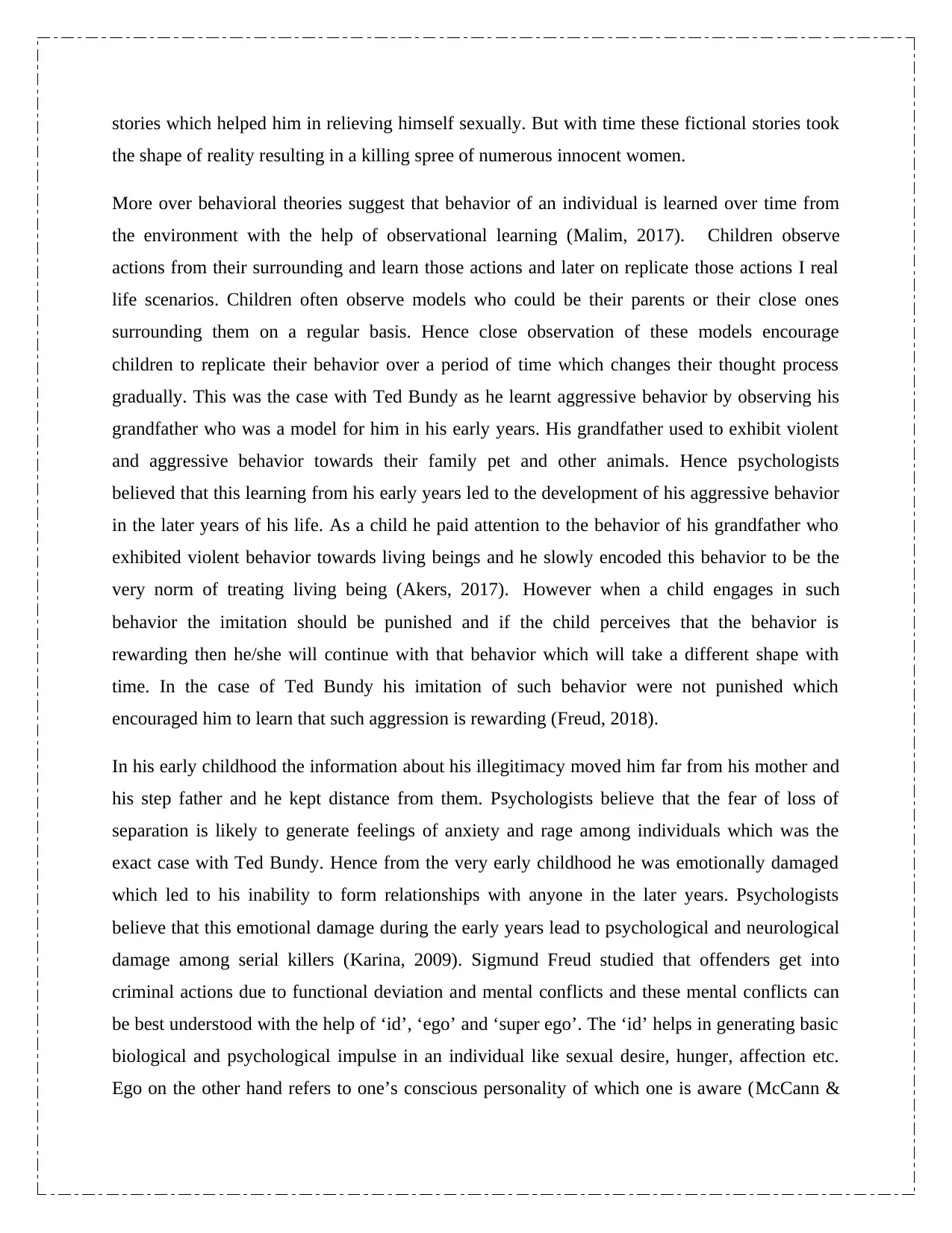
stories which helped him in relieving himself sexually. But with time these fictional stories took
the shape of reality resulting in a killing spree of numerous innocent women.
More over behavioral theories suggest that behavior of an individual is learned over time from
the environment with the help of observational learning (Malim, 2017). Children observe
actions from their surrounding and learn those actions and later on replicate those actions I real
life scenarios. Children often observe models who could be their parents or their close ones
surrounding them on a regular basis. Hence close observation of these models encourage
children to replicate their behavior over a period of time which changes their thought process
gradually. This was the case with Ted Bundy as he learnt aggressive behavior by observing his
grandfather who was a model for him in his early years. His grandfather used to exhibit violent
and aggressive behavior towards their family pet and other animals. Hence psychologists
believed that this learning from his early years led to the development of his aggressive behavior
in the later years of his life. As a child he paid attention to the behavior of his grandfather who
exhibited violent behavior towards living beings and he slowly encoded this behavior to be the
very norm of treating living being (Akers, 2017). However when a child engages in such
behavior the imitation should be punished and if the child perceives that the behavior is
rewarding then he/she will continue with that behavior which will take a different shape with
time. In the case of Ted Bundy his imitation of such behavior were not punished which
encouraged him to learn that such aggression is rewarding (Freud, 2018).
In his early childhood the information about his illegitimacy moved him far from his mother and
his step father and he kept distance from them. Psychologists believe that the fear of loss of
separation is likely to generate feelings of anxiety and rage among individuals which was the
exact case with Ted Bundy. Hence from the very early childhood he was emotionally damaged
which led to his inability to form relationships with anyone in the later years. Psychologists
believe that this emotional damage during the early years lead to psychological and neurological
damage among serial killers (Karina, 2009). Sigmund Freud studied that offenders get into
criminal actions due to functional deviation and mental conflicts and these mental conflicts can
be best understood with the help of ‘id’, ‘ego’ and ‘super ego’. The ‘id’ helps in generating basic
biological and psychological impulse in an individual like sexual desire, hunger, affection etc.
Ego on the other hand refers to one’s conscious personality of which one is aware (McCann &
the shape of reality resulting in a killing spree of numerous innocent women.
More over behavioral theories suggest that behavior of an individual is learned over time from
the environment with the help of observational learning (Malim, 2017). Children observe
actions from their surrounding and learn those actions and later on replicate those actions I real
life scenarios. Children often observe models who could be their parents or their close ones
surrounding them on a regular basis. Hence close observation of these models encourage
children to replicate their behavior over a period of time which changes their thought process
gradually. This was the case with Ted Bundy as he learnt aggressive behavior by observing his
grandfather who was a model for him in his early years. His grandfather used to exhibit violent
and aggressive behavior towards their family pet and other animals. Hence psychologists
believed that this learning from his early years led to the development of his aggressive behavior
in the later years of his life. As a child he paid attention to the behavior of his grandfather who
exhibited violent behavior towards living beings and he slowly encoded this behavior to be the
very norm of treating living being (Akers, 2017). However when a child engages in such
behavior the imitation should be punished and if the child perceives that the behavior is
rewarding then he/she will continue with that behavior which will take a different shape with
time. In the case of Ted Bundy his imitation of such behavior were not punished which
encouraged him to learn that such aggression is rewarding (Freud, 2018).
In his early childhood the information about his illegitimacy moved him far from his mother and
his step father and he kept distance from them. Psychologists believe that the fear of loss of
separation is likely to generate feelings of anxiety and rage among individuals which was the
exact case with Ted Bundy. Hence from the very early childhood he was emotionally damaged
which led to his inability to form relationships with anyone in the later years. Psychologists
believe that this emotional damage during the early years lead to psychological and neurological
damage among serial killers (Karina, 2009). Sigmund Freud studied that offenders get into
criminal actions due to functional deviation and mental conflicts and these mental conflicts can
be best understood with the help of ‘id’, ‘ego’ and ‘super ego’. The ‘id’ helps in generating basic
biological and psychological impulse in an individual like sexual desire, hunger, affection etc.
Ego on the other hand refers to one’s conscious personality of which one is aware (McCann &
Paraphrase This Document
Need a fresh take? Get an instant paraphrase of this document with our AI Paraphraser
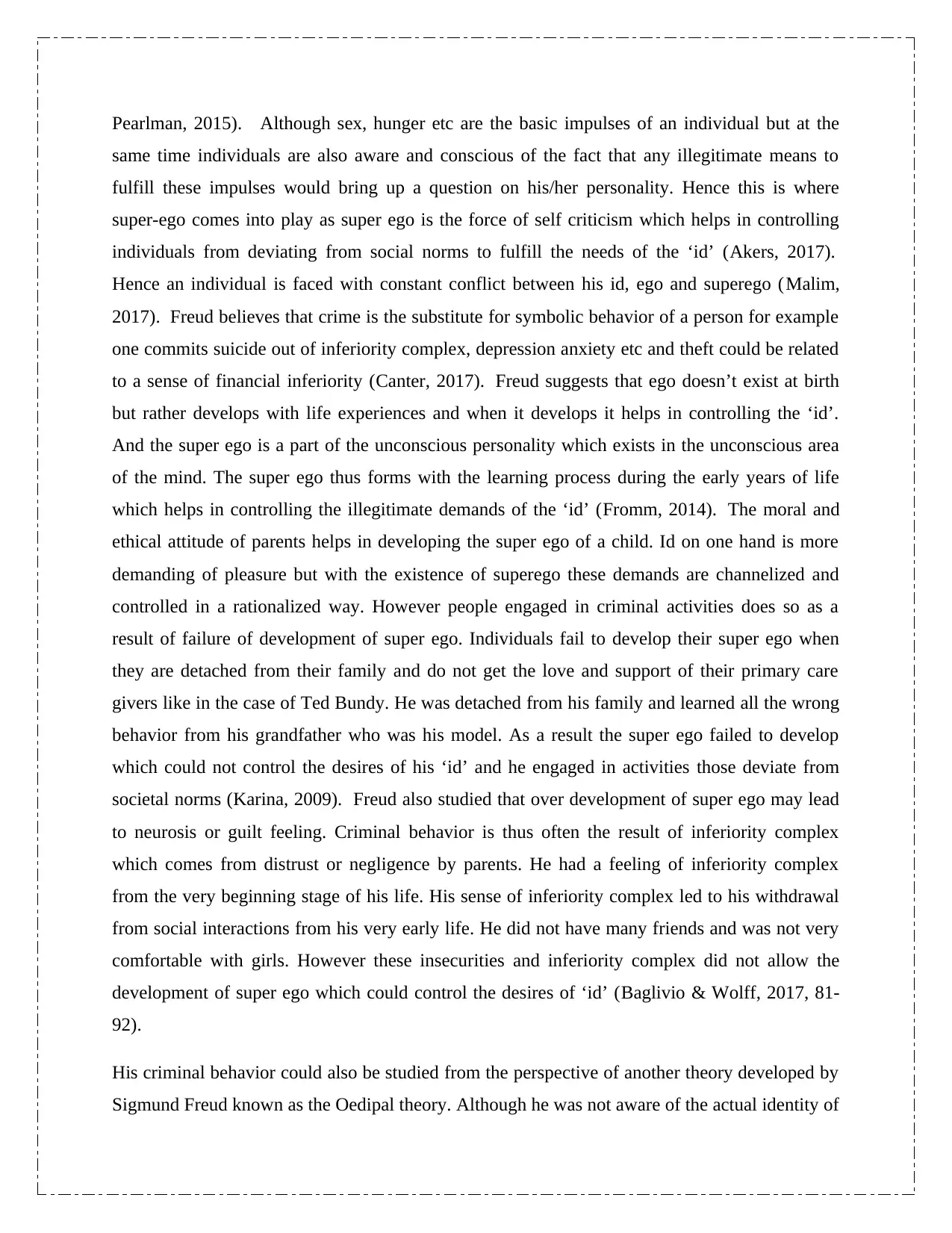
Pearlman, 2015). Although sex, hunger etc are the basic impulses of an individual but at the
same time individuals are also aware and conscious of the fact that any illegitimate means to
fulfill these impulses would bring up a question on his/her personality. Hence this is where
super-ego comes into play as super ego is the force of self criticism which helps in controlling
individuals from deviating from social norms to fulfill the needs of the ‘id’ (Akers, 2017).
Hence an individual is faced with constant conflict between his id, ego and superego (Malim,
2017). Freud believes that crime is the substitute for symbolic behavior of a person for example
one commits suicide out of inferiority complex, depression anxiety etc and theft could be related
to a sense of financial inferiority (Canter, 2017). Freud suggests that ego doesn’t exist at birth
but rather develops with life experiences and when it develops it helps in controlling the ‘id’.
And the super ego is a part of the unconscious personality which exists in the unconscious area
of the mind. The super ego thus forms with the learning process during the early years of life
which helps in controlling the illegitimate demands of the ‘id’ (Fromm, 2014). The moral and
ethical attitude of parents helps in developing the super ego of a child. Id on one hand is more
demanding of pleasure but with the existence of superego these demands are channelized and
controlled in a rationalized way. However people engaged in criminal activities does so as a
result of failure of development of super ego. Individuals fail to develop their super ego when
they are detached from their family and do not get the love and support of their primary care
givers like in the case of Ted Bundy. He was detached from his family and learned all the wrong
behavior from his grandfather who was his model. As a result the super ego failed to develop
which could not control the desires of his ‘id’ and he engaged in activities those deviate from
societal norms (Karina, 2009). Freud also studied that over development of super ego may lead
to neurosis or guilt feeling. Criminal behavior is thus often the result of inferiority complex
which comes from distrust or negligence by parents. He had a feeling of inferiority complex
from the very beginning stage of his life. His sense of inferiority complex led to his withdrawal
from social interactions from his very early life. He did not have many friends and was not very
comfortable with girls. However these insecurities and inferiority complex did not allow the
development of super ego which could control the desires of ‘id’ (Baglivio & Wolff, 2017, 81-
92).
His criminal behavior could also be studied from the perspective of another theory developed by
Sigmund Freud known as the Oedipal theory. Although he was not aware of the actual identity of
same time individuals are also aware and conscious of the fact that any illegitimate means to
fulfill these impulses would bring up a question on his/her personality. Hence this is where
super-ego comes into play as super ego is the force of self criticism which helps in controlling
individuals from deviating from social norms to fulfill the needs of the ‘id’ (Akers, 2017).
Hence an individual is faced with constant conflict between his id, ego and superego (Malim,
2017). Freud believes that crime is the substitute for symbolic behavior of a person for example
one commits suicide out of inferiority complex, depression anxiety etc and theft could be related
to a sense of financial inferiority (Canter, 2017). Freud suggests that ego doesn’t exist at birth
but rather develops with life experiences and when it develops it helps in controlling the ‘id’.
And the super ego is a part of the unconscious personality which exists in the unconscious area
of the mind. The super ego thus forms with the learning process during the early years of life
which helps in controlling the illegitimate demands of the ‘id’ (Fromm, 2014). The moral and
ethical attitude of parents helps in developing the super ego of a child. Id on one hand is more
demanding of pleasure but with the existence of superego these demands are channelized and
controlled in a rationalized way. However people engaged in criminal activities does so as a
result of failure of development of super ego. Individuals fail to develop their super ego when
they are detached from their family and do not get the love and support of their primary care
givers like in the case of Ted Bundy. He was detached from his family and learned all the wrong
behavior from his grandfather who was his model. As a result the super ego failed to develop
which could not control the desires of his ‘id’ and he engaged in activities those deviate from
societal norms (Karina, 2009). Freud also studied that over development of super ego may lead
to neurosis or guilt feeling. Criminal behavior is thus often the result of inferiority complex
which comes from distrust or negligence by parents. He had a feeling of inferiority complex
from the very beginning stage of his life. His sense of inferiority complex led to his withdrawal
from social interactions from his very early life. He did not have many friends and was not very
comfortable with girls. However these insecurities and inferiority complex did not allow the
development of super ego which could control the desires of ‘id’ (Baglivio & Wolff, 2017, 81-
92).
His criminal behavior could also be studied from the perspective of another theory developed by
Sigmund Freud known as the Oedipal theory. Although he was not aware of the actual identity of
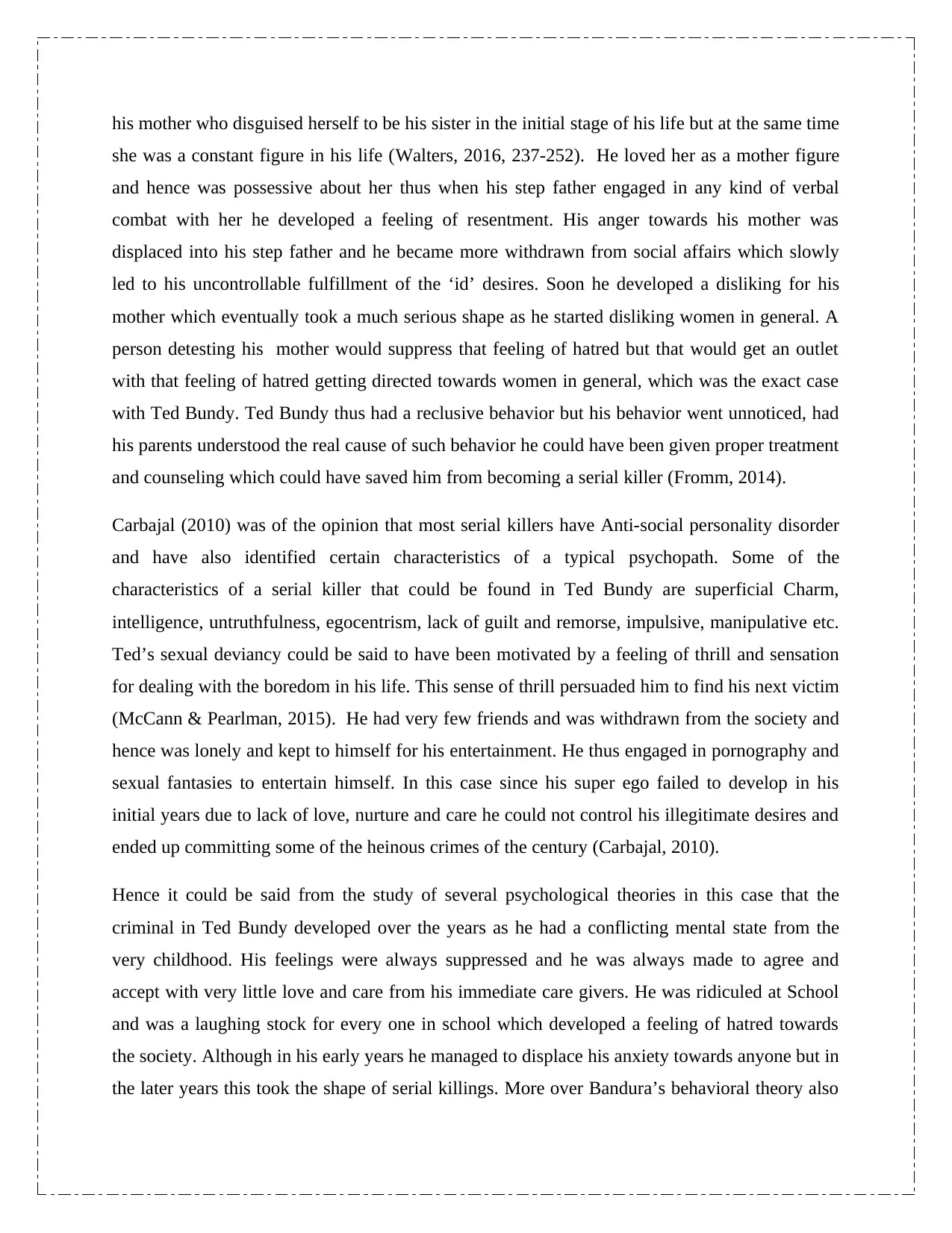
his mother who disguised herself to be his sister in the initial stage of his life but at the same time
she was a constant figure in his life (Walters, 2016, 237-252). He loved her as a mother figure
and hence was possessive about her thus when his step father engaged in any kind of verbal
combat with her he developed a feeling of resentment. His anger towards his mother was
displaced into his step father and he became more withdrawn from social affairs which slowly
led to his uncontrollable fulfillment of the ‘id’ desires. Soon he developed a disliking for his
mother which eventually took a much serious shape as he started disliking women in general. A
person detesting his mother would suppress that feeling of hatred but that would get an outlet
with that feeling of hatred getting directed towards women in general, which was the exact case
with Ted Bundy. Ted Bundy thus had a reclusive behavior but his behavior went unnoticed, had
his parents understood the real cause of such behavior he could have been given proper treatment
and counseling which could have saved him from becoming a serial killer (Fromm, 2014).
Carbajal (2010) was of the opinion that most serial killers have Anti-social personality disorder
and have also identified certain characteristics of a typical psychopath. Some of the
characteristics of a serial killer that could be found in Ted Bundy are superficial Charm,
intelligence, untruthfulness, egocentrism, lack of guilt and remorse, impulsive, manipulative etc.
Ted’s sexual deviancy could be said to have been motivated by a feeling of thrill and sensation
for dealing with the boredom in his life. This sense of thrill persuaded him to find his next victim
(McCann & Pearlman, 2015). He had very few friends and was withdrawn from the society and
hence was lonely and kept to himself for his entertainment. He thus engaged in pornography and
sexual fantasies to entertain himself. In this case since his super ego failed to develop in his
initial years due to lack of love, nurture and care he could not control his illegitimate desires and
ended up committing some of the heinous crimes of the century (Carbajal, 2010).
Hence it could be said from the study of several psychological theories in this case that the
criminal in Ted Bundy developed over the years as he had a conflicting mental state from the
very childhood. His feelings were always suppressed and he was always made to agree and
accept with very little love and care from his immediate care givers. He was ridiculed at School
and was a laughing stock for every one in school which developed a feeling of hatred towards
the society. Although in his early years he managed to displace his anxiety towards anyone but in
the later years this took the shape of serial killings. More over Bandura’s behavioral theory also
she was a constant figure in his life (Walters, 2016, 237-252). He loved her as a mother figure
and hence was possessive about her thus when his step father engaged in any kind of verbal
combat with her he developed a feeling of resentment. His anger towards his mother was
displaced into his step father and he became more withdrawn from social affairs which slowly
led to his uncontrollable fulfillment of the ‘id’ desires. Soon he developed a disliking for his
mother which eventually took a much serious shape as he started disliking women in general. A
person detesting his mother would suppress that feeling of hatred but that would get an outlet
with that feeling of hatred getting directed towards women in general, which was the exact case
with Ted Bundy. Ted Bundy thus had a reclusive behavior but his behavior went unnoticed, had
his parents understood the real cause of such behavior he could have been given proper treatment
and counseling which could have saved him from becoming a serial killer (Fromm, 2014).
Carbajal (2010) was of the opinion that most serial killers have Anti-social personality disorder
and have also identified certain characteristics of a typical psychopath. Some of the
characteristics of a serial killer that could be found in Ted Bundy are superficial Charm,
intelligence, untruthfulness, egocentrism, lack of guilt and remorse, impulsive, manipulative etc.
Ted’s sexual deviancy could be said to have been motivated by a feeling of thrill and sensation
for dealing with the boredom in his life. This sense of thrill persuaded him to find his next victim
(McCann & Pearlman, 2015). He had very few friends and was withdrawn from the society and
hence was lonely and kept to himself for his entertainment. He thus engaged in pornography and
sexual fantasies to entertain himself. In this case since his super ego failed to develop in his
initial years due to lack of love, nurture and care he could not control his illegitimate desires and
ended up committing some of the heinous crimes of the century (Carbajal, 2010).
Hence it could be said from the study of several psychological theories in this case that the
criminal in Ted Bundy developed over the years as he had a conflicting mental state from the
very childhood. His feelings were always suppressed and he was always made to agree and
accept with very little love and care from his immediate care givers. He was ridiculed at School
and was a laughing stock for every one in school which developed a feeling of hatred towards
the society. Although in his early years he managed to displace his anxiety towards anyone but in
the later years this took the shape of serial killings. More over Bandura’s behavioral theory also
⊘ This is a preview!⊘
Do you want full access?
Subscribe today to unlock all pages.

Trusted by 1+ million students worldwide

suggests that behavior is learned over a period of time which highlights the fact that from the
very early years he observed his grandfather who was a violent and abusive man. Since all these
life events shaped his mind and his feelings and contributed to the path that he eventually chose
for himself. No one is a born criminal but the society and the social surroundings shape up the
personality of an individual like it can be seen in the case of Ted Bundy. Had he got the love and
care and the attachment from his parents he could have been a different man as his super ego
would have developed and controlled the desires of his ‘id’. His actions could be simply said to
be that of an excitement to avenge the past anger which came from rejection and humiliation that
he faced from the very early years of his life.
very early years he observed his grandfather who was a violent and abusive man. Since all these
life events shaped his mind and his feelings and contributed to the path that he eventually chose
for himself. No one is a born criminal but the society and the social surroundings shape up the
personality of an individual like it can be seen in the case of Ted Bundy. Had he got the love and
care and the attachment from his parents he could have been a different man as his super ego
would have developed and controlled the desires of his ‘id’. His actions could be simply said to
be that of an excitement to avenge the past anger which came from rejection and humiliation that
he faced from the very early years of his life.
Paraphrase This Document
Need a fresh take? Get an instant paraphrase of this document with our AI Paraphraser
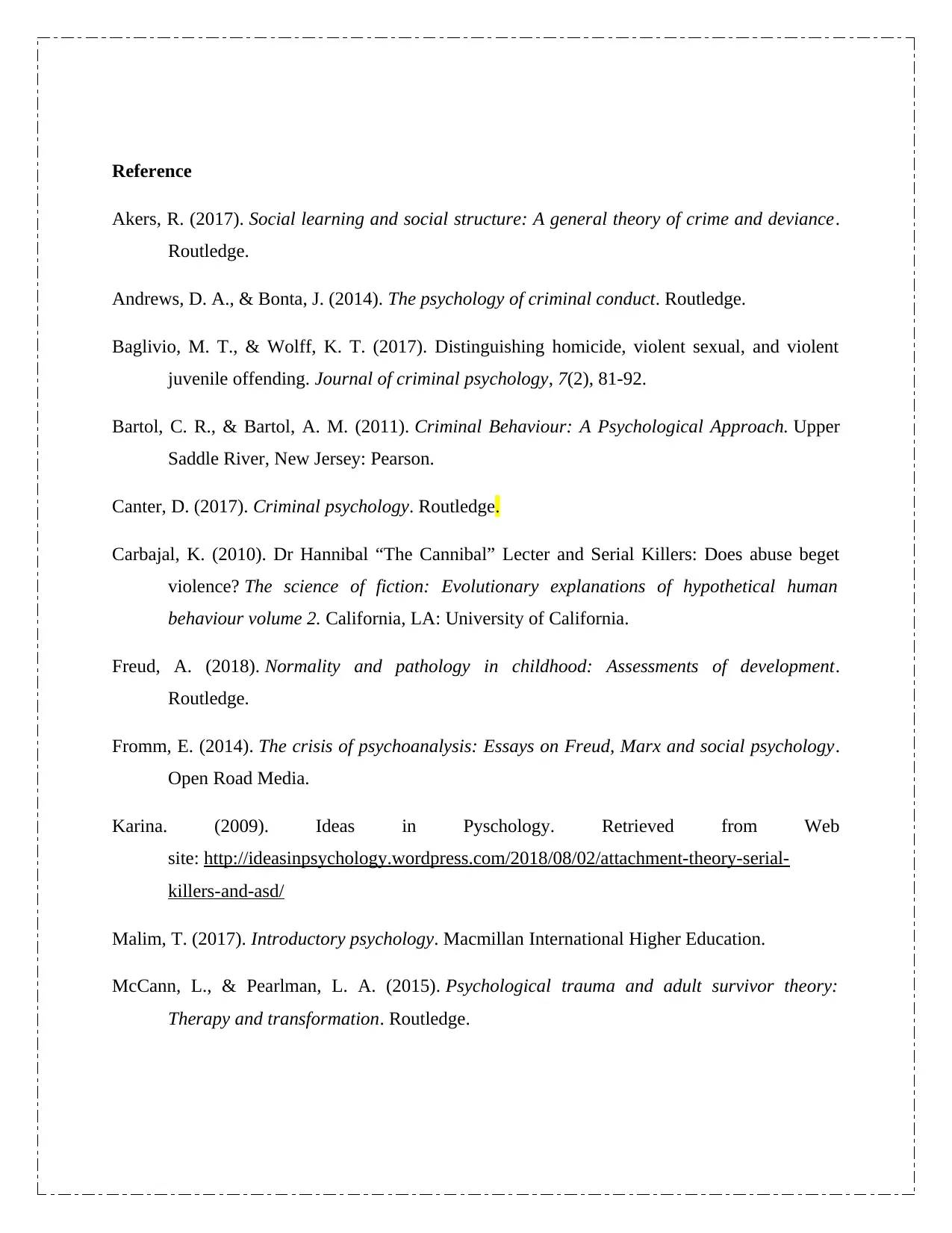
Reference
Akers, R. (2017). Social learning and social structure: A general theory of crime and deviance.
Routledge.
Andrews, D. A., & Bonta, J. (2014). The psychology of criminal conduct. Routledge.
Baglivio, M. T., & Wolff, K. T. (2017). Distinguishing homicide, violent sexual, and violent
juvenile offending. Journal of criminal psychology, 7(2), 81-92.
Bartol, C. R., & Bartol, A. M. (2011). Criminal Behaviour: A Psychological Approach. Upper
Saddle River, New Jersey: Pearson.
Canter, D. (2017). Criminal psychology. Routledge.
Carbajal, K. (2010). Dr Hannibal “The Cannibal” Lecter and Serial Killers: Does abuse beget
violence? The science of fiction: Evolutionary explanations of hypothetical human
behaviour volume 2. California, LA: University of California.
Freud, A. (2018). Normality and pathology in childhood: Assessments of development.
Routledge.
Fromm, E. (2014). The crisis of psychoanalysis: Essays on Freud, Marx and social psychology.
Open Road Media.
Karina. (2009). Ideas in Pyschology. Retrieved from Web
site: http://ideasinpsychology.wordpress.com/2018/08/02/attachment-theory-serial-
killers-and-asd/
Malim, T. (2017). Introductory psychology. Macmillan International Higher Education.
McCann, L., & Pearlman, L. A. (2015). Psychological trauma and adult survivor theory:
Therapy and transformation. Routledge.
Akers, R. (2017). Social learning and social structure: A general theory of crime and deviance.
Routledge.
Andrews, D. A., & Bonta, J. (2014). The psychology of criminal conduct. Routledge.
Baglivio, M. T., & Wolff, K. T. (2017). Distinguishing homicide, violent sexual, and violent
juvenile offending. Journal of criminal psychology, 7(2), 81-92.
Bartol, C. R., & Bartol, A. M. (2011). Criminal Behaviour: A Psychological Approach. Upper
Saddle River, New Jersey: Pearson.
Canter, D. (2017). Criminal psychology. Routledge.
Carbajal, K. (2010). Dr Hannibal “The Cannibal” Lecter and Serial Killers: Does abuse beget
violence? The science of fiction: Evolutionary explanations of hypothetical human
behaviour volume 2. California, LA: University of California.
Freud, A. (2018). Normality and pathology in childhood: Assessments of development.
Routledge.
Fromm, E. (2014). The crisis of psychoanalysis: Essays on Freud, Marx and social psychology.
Open Road Media.
Karina. (2009). Ideas in Pyschology. Retrieved from Web
site: http://ideasinpsychology.wordpress.com/2018/08/02/attachment-theory-serial-
killers-and-asd/
Malim, T. (2017). Introductory psychology. Macmillan International Higher Education.
McCann, L., & Pearlman, L. A. (2015). Psychological trauma and adult survivor theory:
Therapy and transformation. Routledge.

Walters, G. D. (2016). Crime continuity and psychological inertia: Testing the cognitive
mediation and additive postulates with male adjudicated delinquents. Journal of
quantitative criminology, 32(2), 237-252.
mediation and additive postulates with male adjudicated delinquents. Journal of
quantitative criminology, 32(2), 237-252.
⊘ This is a preview!⊘
Do you want full access?
Subscribe today to unlock all pages.

Trusted by 1+ million students worldwide
1 out of 9
Related Documents
Your All-in-One AI-Powered Toolkit for Academic Success.
+13062052269
info@desklib.com
Available 24*7 on WhatsApp / Email
![[object Object]](/_next/static/media/star-bottom.7253800d.svg)
Unlock your academic potential
Copyright © 2020–2026 A2Z Services. All Rights Reserved. Developed and managed by ZUCOL.





